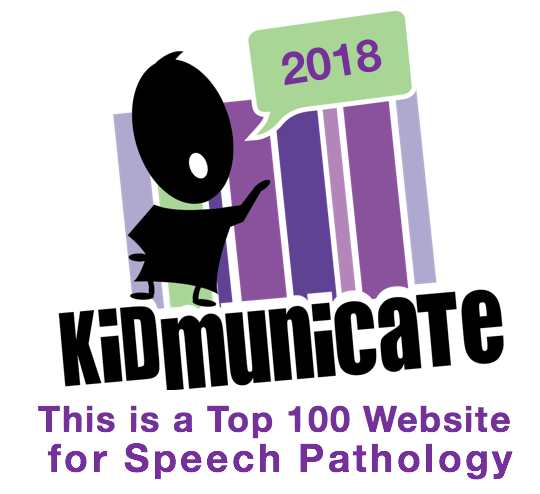In the process of doing a little analytics of my own site, I stumbled across a small critique from academic circles. First of all, I have to say I am happy that anyone is talking about my site at all, especially within a college setting. The commenter said that she loved the way SpeechTechie makes people aware of what is "out there" and possible in technology integration. However, she also stated:
I think serious questions must be raised though about how to identify, assess, implement, and evaluate whether these technologies meet students' needs. The conversations about how to then examine the highlighted resources in light of important contextual factors at their placement are limited.
I think that what this commenter says is certainly true, and that my making this exact kind of disclaimer is long overdue. We are clinicians and professionals after all, and operate in an climate where Evidence Based Practice (EBP) is rightfully emphasized. That said, the purpose of this blog is not to zone in on EBP; the resources presented here simply provide a context in which it can occur. The assessment of whether the technological resources presented here meet your students' individual needs? I am going to leave that up to you!
Here's one point I think the commenter misses, which perhaps I have not made clear up to this time (but, to be honest, I think I have): much of what is presented here is reviews of tech activities that can be used as the centerpiece of a session, around which you can build all the language stimulation, scaffolding and assessment that you do so well, and it is really those procedures that should be evaluated. I am not going to be engaging in depth about examining a particular, focused interactive website and whether it really meets students' needs because the technology is not really the point. The activities are just a hook for our children, and it's what you do before, during and after their use (as well as the assessment that only you can do, since I don't know your students) that qualifies them as therapy (and EBP). I think to hold me responsible for extensively evaluating, say, the effect of the Simple Machines activity would be akin to insisting on the extensive evaluation of one storybook, board game, recipe or craft activity versus another. Of course these procedures should be assessed, but we perhaps don't need to do double-blind studies on them.
All that said, for an example of how many of the resources presented here could be "sandwiched" in EBP bread, check out the Writing Next meta-analysis. It's an interesting read and it discusses the efficacy of nine language-based strategies to develop written language (and with the oral connection to writing, we all can see the connection to our work). Specifically, for example, instruction around sentence combining could be a post-activity to presentation of a BrainPop movie- simply compose a series of simple sentences about the topic and get ready to have your kids combine 'em!
I truly don't mean for this to sound defensive- I've seen clinical blogs that provide disclaimers and have been thinking- it's time for mine!
Subscribe to:
Post Comments (Atom)





I agree EBP is important, however, I also feel it is clear that the resources you present are "tools" to aide in the development of speech/language skills. It is beyond the scope of your blog to address EBP or reference research articles in support of every resource you mention. That said, thanks for sharing the "critique" of your blog. The point was well taken and I have now added a "disclaimer" page to my own blog.
ReplyDeleteSean, thanks for all you do!!! It is annoying that someone will always find something critical to say. We all [should] know that you present fabulous ideas for enriching our therapy and making it current and interesting for children and it is our responsibility as good therapists to make sure we use these resources as yet another way to achieve our goals effectively and measurably. Go speech techie!!!
ReplyDeleteThanks so much for the resources you share so regularly. At some level I think it is important to expect your professional readers to be able to think for themselves and determine whether a particular technology is appropriate for their student or not. I think we all appreciate you stimulating discussion and consideration of new technology options in our quickly changing world. I, for one, do not expect you to research the efficacy of implementing the technology you share. I can manage that myself. Thanks again!
ReplyDeleteThanks, guys- I knew you speechtechies would largely feel the same way!
ReplyDeleteI agree with everyone here and want to thank you, SpeechTechie, for taking the time to share your ideas with us. By using technology, it steps outside the box to interest our students. So many times we run out of ideas and by having resources like yours, it makes it easier to develop engaging therapy activities for our youngsters. As professionals, we don't need to have our hand held and told step by step what to do. Taking the idea and implementing the EBPs...that's what makes us a good therapist!! Thanks again for your blog.
ReplyDeleteSean, I am so glad you wrote about this. I had this discussion the other day with one other SLP. Here is food for thought:
ReplyDeleteTechnology and all these news gadgets are INNOVATION within our field. We have never seen so many "new" things. How are we supposed to try to move forwards and try new things if we are always bind to EBP?
If we only use EBP we will never see the possibilities of an even (possibly better) technique that probably will come to be EBP in the future as more people use it and research how to BEST implement it. ( I guess this topic deserves a post on my end to)
Thanks Sean.
Thanks, Rebecca!
ReplyDeleteHey Barbara, you make an excellent point there about innovation!!! Thank you.
Thanks for all you do. As SLPs, we can use our professional judgement and use them appropriately.
ReplyDeleteVery useful post i really appreciate thanks for sharing such a nice post.
ReplyDelete-facial tissue suppliers